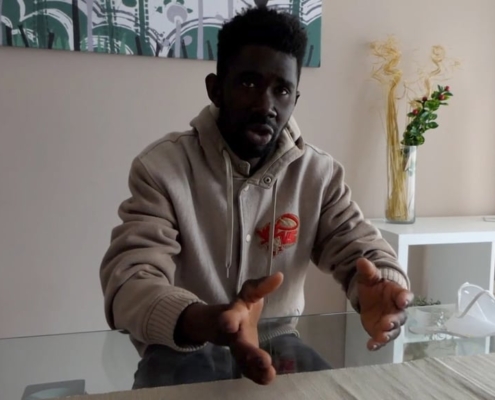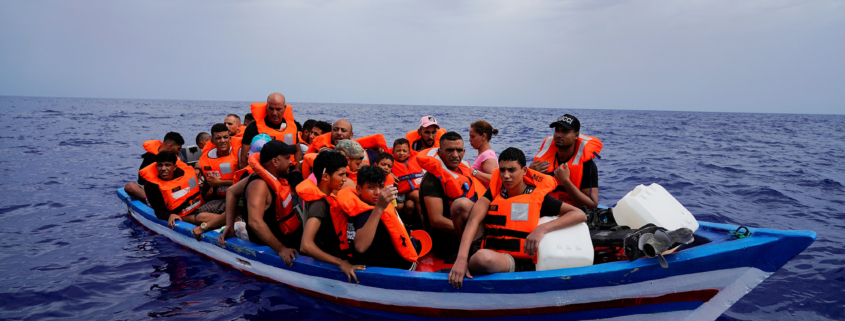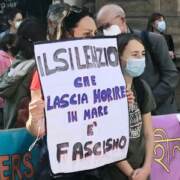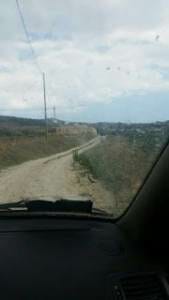Minors indicted for human trafficking
Article first published on September 13, 2022
Essenziale.it – Saidu Bangura was arrested and put in prison because he drove the boat that brought him to Italy along with about a hundred other people fleeing Libya. Yet he does not understand why they put him in prison once he landed in Italy: after all, he made sure everyone was saved.
Joof Ousaineu also arrived in Sicily via the central Mediterranean. He was not 16 years old yet and was the youngest on board. He was seasick during the long hours of crossing and spent the whole time lying in the middle of the boat. He could not say who was driving the boat. “It was dark and I was sick,” he says. For seven years he has been pleading his innocence before the Italian justice system. When he was rescued he was so dehydrated that he was taken to hospital, so how could he have been the driver? In the ward he was guarded by the police, then he was arrested and tried by an ordinary court. The Italian justice system did not believe he was a minor: according to an X-ray of his wrist he was 18 years old. Saidu was also tried in Italy as an adult: but his arrest took place the day before he turned 18. “Emergency immigration legislation produces legal monsters,” explains Ousaineu’s lawyer, Cinzia Pecoraro.
It is not known how many minors, like Bangura and Ousaineu, have been arrested, tried and sometimes convicted in Italy in recent years for driving boats carrying irregular migrants. The charge is aiding and abetting illegal immigration, an offence under Article 12 of the Italian Migration Law. Over the years, the regulation has been amended several times and according to many civil society associations it has ended up becoming a weapon to criminalise people entering Italy and non-governmental organisations dealing with migration.
Today, however, the wind is changing and many of those trials are ending in a deadlock. In May, some volunteers from Baobab Experience, an association that in the last six years has provided humanitarian aid to almost one hundred thousand men, women and children in transit through Rome, were acquitted of the charge of aiding and abetting illegal immigration. “Here in Palermo in recent years, many trials of boys and men who landed in Italy as so-called ‘scafisti’ (‘people smugglers’) have ended with acquittals. The courts are beginning to understand,” says Pecoraro. “The same is not happening in other Sicilian courts, where you can still get 30 years in prison.”

Joof in Palermo, april 9, 2022 (Angela Gennaro)
According to the lawyers who have defended Bangura and Ousaineu in recent years – Pecoraro in Palermo and Paola Ottaviano in Catania – the arrest of the so-called ‘scafisti’ is part of a strategy: to demonstrate to Europe and the Italian public that Italy is fighting human trafficking from Libya. This need arose in 2013, in the wake of the international outrage following the shipwreck on October 3, when at least 368 people drowned a few hundred metres off the coast of Lampedusa.
Since then, the lawyers say, Sicilian prosecutors have become ‘very active’ in applying the offence of aiding and abetting illegal immigration. And the charges also involved many minors: young people, sometimes children, who are tried in Italy as adults. Without any consequences for the criminal organisations: the real traffickers remain in Libya. “The boats that cross the central Mediterranean have no crew. The smugglers and traffickers are not on board: they remain in Libya,” explains Stefania Gasparri, a volunteer at the Astalli centre in Catania. Since 1999, the association has been assisting “men and women fleeing war and persecution, often victims of torture, who arrive after journeys on the edge of reality.”
State of necessity
Antigone’s Juvenile Observatory “for rights and guarantees in the penal system” founded in the late 1980s, raised the alarm in 2017. “Visiting the four Sicilian juvenile institutes and the Sardinian one, the Quartucciu in Cagliari, we found several boys on whom the terrible accusation of being traffickers hung,” explains Susanna Marietti, coordinator of the Observatory. “It was madness. I remember one boy who only spoke a minor dialect of an African country and could not understand what was happening to him. He was in prison for human trafficking, but obviously, he was a victim. Ten times a victim.”
According to the Ministry of Justice, the phenomenon is in sharp decline. In 2017, the Catania public prosecutor’s office began to change its line, with a circular issued by prosecutor Carmelo Zuccaro, illustrated by the magistrate in Rome at a hearing before a parliamentary committee. The committee was in charge of overseeing the implementation of the Schengen agreement on the area of free movement, the supervision of Europol’s activity, and the control and supervision in immigration matters. “It was urged not to jump too readily to accusing them of aiding and abetting illegal immigration, knowing that very rarely these boys are actually guilty of it,” Marietti says.
In fact, they are usually boys “who perhaps held their hand on the tiller or handed out flasks of water: boys who are not guilty, but were probably instructed by the traffickers in Libya on what they had to do on board.” After acknowledging the ‘state of necessity’ of the boys forced by criminal organisations to act as ‘drivers’ of small boats laden with humanity, Zuccaro however pointed the finger at the role of non-governmental organisations engaged in sea rescue. “The immediate intervention by NGO ships also makes investigating the leaders of criminal organisations useless, making the investigations more difficult,” he said.
Only the Bicocca juvenile prison in Catania provided the Antigone association with data: boys accused of driving boats with irregular migrants were 7 in 2012, 9 in 2013, 15 in 2014, 9 in 2015, 12 in 2016. In those years, the Juvenile Penitentiary Institute (Ipm) of Catania was filled with foreign boys accused of aiding and abetting illegal immigration. Article 4 bis of the penitentiary order prohibiting the granting of benefits was applied to many, a measure that since 2018 is no longer allowed in juvenile institutes.
The question we should ask ourselves is: why criminalise them?
“Many of those boys were simple fishermen,” explains Elvira Iovine of the Astalli centre in Catania, a volunteer at the juvenile prison. “They knew the sea and they knew how to drive the boat.” “They were given a leading role in the boat,” explains the director of the Ipm in Catania, Maria Randazzo. “They distributed water, food, sometimes they drove. They were often used for their skills with technology, because maybe they knew how to use a mobile phone, they also spoke English or French and so they could make themselves understood by all the people on board. But they did not make any money out of it, nor were they part of the criminal organisation.”
At the institute the meaning of aiding and abetting illegal immigration was explained to them. There are very few boys who “may actually come from families of traffickers and are aware of what they are doing”, the director continues. Almost all of them have escaped from situations of extreme poverty, often thanks to money from their families, who incur debts to afford it. They have been through torture in Libyan lagers. As Richard Brodie of Arci Porco Rosso, a social club based in Piazza Casa Professa, in Palermo’s Ballarò district, says, “we should not ask ourselves why they are driving a boat. The question we should be asking is: why criminalise them?”
The European collective of journalists Lost in Europe, which has been telling the stories of unaccompanied foreign minors arriving in Europe since 2018, has tried in recent years to reconstruct the phenomenon of “underage boatmen”. Thanks to their work, we made a video for the news agency Ansa on Saidu Bangura and Joof Ousaineu. Also Moussa (not his real name), originally from Senegal, who was arrested during the landing in Trapani at the age of 16, has a similar story, which was recounted by Ismail Einashe for BBC in March.
According to the report ‘From the Sea to Prison’ by Alarm Phone, a project set up in 2014 that established an emergency number for migrants in distress in the Mediterranean, and Arci Porco Rosso, from 2013 to 2021 there had been at least “2,500 arrests of migrants accused of being ‘scafisti’ in summary trials”. This figure was taken by cross-referencing police data and news reports. “We have seen multiple sentences ending in sentences of five, eight, ten years in prison, even life imprisonment, if there were victims on the sea voyage,” says Richard Brodie of Arci Porco Rosso. “The point is that instead of going after the real criminal organisation and its leadership, the police took one migrant in every hundred to investigate and charge them with this offense. These are very high numbers.”
Switching on the engine
Saidu Bangura was 13 years old when he ran away from Sierra Leone and his father’s family to search, unsuccessfully, for his mother who had left home when he was very young. He crossed the desert, was kidnapped, tortured, blackmailed: first in Algeria, then in Libya. He travelled for five years before arriving in Pozzallo, where he landed in 2018 and was arrested on charges of driving a boat carrying irregular migrants. It was the day before his 18th birthday, but Italy tried him as an adult.
“My dad wanted to kill me because he thought I had become a Christian,” says Joof Ousaineu. He fled from Gambia and the suspicion of betraying Islam. “True, I used to go to church. But only to listen,” he says. He travelled through Senegal, Mali, Niger and finally arrived in Libya. An Italian coast guard ship rescued the boat he was travelling on, which had left from Zwara. Some of his ‘fellow travelers’ say that Ousaineu was the one driving it. Ousaineu who was taken to hospital because he was dehydrated, who was sick the whole time, who had not yet turned 16.
“Upon disembarking Joof declared his real age,” says lawyer Pecoraro. But since the X-ray of his wrist “was compatible with the age of maturity”, Joof spent eleven months in Palermo’s Pagliarelli prison. A minor among adults. “And innocent,” adds Pecoraro. “When I met him, I knew immediately that he was a child.” The lawyer contacted the Gambian embassy and with a bit of luck she managed to trace the family, who sent Ousaineue’s birth certificate and school ID card with a photo to Italy, documents that Pecoraro presented to the court.
The smile that normally lights up his face today is gone. “I can’t sleep,” he recounts.
“The judge discharged the boy and sent the accusation back to the juvenile court: in the sentence he questioned the effectiveness of the technique used in Italy to establish an individual’s age.” The parameters used to read the X-rays of the wrist, reads the judgement, “refer to the Anglo-Saxon population of the 1950s.” They are therefore “hardly applicable with veracity to today’s African population”, the lawyer adds. The evidence also has a stated margin of error ranging from six to 24 months.
Today, Ousaineu lives near Palermo, in Partinico, works as a sheepherder and lives in a shared flat. His case is still pending before the juvenile court. His lawyer wants to go all the way to prove his innocence. “We will succeed,” she assures. “Joof didn’t even see who was driving the boat he was travelling on.”
Saidu Bangura now lives in a community of nuns, works as a pizza maker in Modica and is awaiting his hearing for probation, the measure that allows the crime to be extinguished in the event of a positive outcome of a probationary period granted to the defendant. His lawyer, Paola Ottaviano, also managed to bring his case before the juvenile court after many years. “I didn’t know it was a crime,” says Bangura. “Yes, I was driving the boat. What else could I do? I was trying to save my life. To save our lives,” he says.
In Libya, at the collection point where migrants were crammed into boats for the crossing to Italy, Bangura was the one with no money, but also the smartest. “One night I was taken with another boy to a marina. ‘If you can start the engine you are free’, they told me”. He succeeded, but he was not freed: every night for a week he was let out and taken to the beach to be taught how to drive by the real smugglers, who stay in Libya and to whom European justice does not reach. “If you turn back, we will shoot you,” they told him on the last night after letting him on board with other people. The smile that lights up his face today is gone. “I can’t sleep, all my brain does is think about everything that happened and it won’t stop,” he says.
“I was very angry because I was foreign, African, black: I think that’s why they did this to me,” says Ousaineu with his uncertain, shy voice in his lawyer’s office in Palermo. “I hope all this will end, so I will be truly free.” His dream is to become a cook. But he does not have a residence permit, and he works illegally. For the time being he just attends his hearings, months apart amid countless postponements. “Each time I lose a day’s work, often only to find that the hearing has been postponed.”
Cecilia Ferrara, Angela Gennaro
Translated from Italian by Francesca Cavallo and Matthew Campbell



